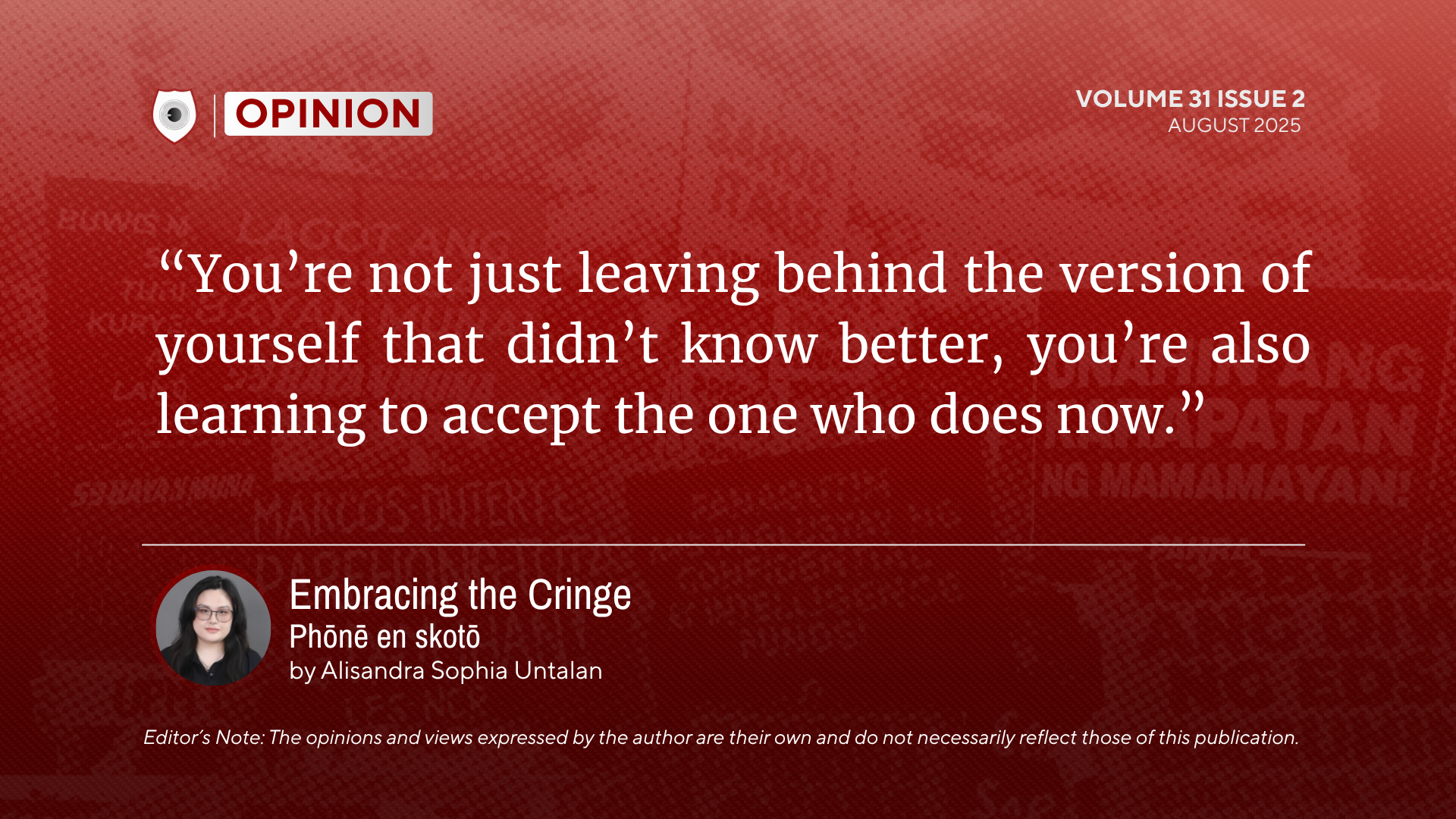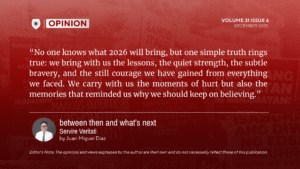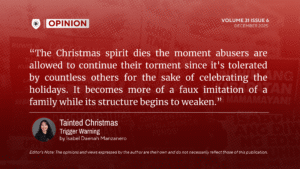By Alisandra Sophia M. Untalan | August 2, 2025
Embracing the Cringe
THERE are things in life we resist, moments we fight to forget, rewrite, or avoid entirely.
It takes a while to realize that maybe some things are meant to happen, not because they’re fair or easy, but because they teach us something we wouldn’t learn otherwise. As painfully simple as it sounds, it doesn’t come easy. The sentiment itself is stitched together by experience, discomfort, and endless self-cringe. And while I didn't always see the value in those situations, they lingered until I had no choice but to assess them.
We’ve all been there—stuck in that moment where we replay a scenario over and over in our heads, even wishing it never happened at all. Whether it's a full-blown failure or just that one horribly awkward moment you can’t stop cringing at, it lingers. I’m talking about those memories, the second-hand embarrassment you get from your past self.
And slowly, we start building this idealized version of reality, one where we nailed that joke, didn’t trip over our words, or didn’t confess to that one person we knew didn’t like us back. We imagine how much better it would’ve been if life had just followed the script we made in our heads. In that version, everything falls perfectly into place. No awkward silences. No facepalms. No late-night flashbacks of “hey, you remember when–” and it’s you tripping on a piece of wood, rolling on the ground, in front of hundreds of people.
Just the smooth, polished version of the story–where we never had to flinch at the memory. But life doesn’t work that way.
We convinced ourselves that avoiding a single humiliating social fail would have led to a better life. However, it's uncertain if we would have met the same people, gained self-awareness, or found humor in the situation later on. It might even seem as if our future selves would be better off, just less awkward. Yet, I believe it's those awkward moments that often play a significant role in shaping one’s identity.
High School is often the choice of hyperfixation when it comes to embarrassing moments. Thus, making it a challenging phase for most of my generation. All it took was one stereotype smacking you in the face during the first few weeks of seventh grade, and your puberty-ridden life takes a permanent turn for the worst.
I’d imagine our collective experiences are either more bearable or somehow even more cringe-inducing than others. One thing’s for sure, it still sleeps on that uncomfortable chair at the back of your mind, like a cat naturally clawing its way up and down, scratching every quiet moment you have with yourself, thus outwardly cringing when you remember. Like a scar, it's there forever.
And the details, who could forget? People, staring at you, judging you, with that arrogant scrunch on their forehead, probably thinking “What is this dude doing, this is embarrassing!” Like they’ve never encountered anything like it. Hypocritical, but realistic. You’ve probably thought that way about another humiliated person, but never thought to take the high road. Why? As they all say, it’s a canon event. And what do they say about canon events? We must not interfere, because it’s an event that has to crucially happen to a person for the betterment of their growth and development.
In my opinion, I used to think the canon event trend was complete BS. Every ounce of its concept represented this inevitable present moment that nobody, even the masters of the universe, are not allowed to change. Because everything happens for a reason. Which is a broader perspective on my point, but saying that a universal law demands you be deeply embarrassed over something that could easily be re-altered into a decent version feels unfair. And it should.
And I get it, it's a process. We don’t have to hate ourselves for how we handled things, but at some point, we have to face it. A low-probability, unfortunate moment happened, and you’re allowed to feel discouraged. Still, you have to admit, you learned something. These moments, no matter how small or embarrassing, teach us about action and consequence, right from wrong, social cues, and the people around us. They force us to adapt, to grow. You’re not just leaving behind the version of yourself that didn’t know better, you’re also learning to accept the one who does now. In doing so, you became a more versatile machine, ready for the next experience.
Without these moments, would we even know how to carry ourselves? Would we be tactless? Clueless? Maybe even senseless. In hindsight, they’ve given us more than just discomfort, they’ve taught us awareness. As uncomfortable as those moments might be, they offer something valuable: resilience, perspective, and the quiet strength to laugh at ourselves.
But that’s the thing about growth, isn’t it? The ability to laugh at ourselves as we come across the borders of self-awareness and self-reflection. It’s in those cringeworthy, uncomfortable moments where all you need to do next is to learn about yourself. And isn’t that the ultimate goal, to really know yourself, to embrace every aspect, no matter how imperfect? After all, comfort zones are meant to be broken.
At the end of the day, it’s not about wishing things went differently or regretting past actions. It’s about accepting those “canon events,” the mess-ups, the embarrassing moments, the things we wish we could erase—they are a part of our story.
So, maybe, we don’t need to alter those moments after all. Perhaps they’re the very moments that lead us to a more authentic, self-aware version of ourselves. And that's something worth embracing.
Volume 31 | Issue 1




